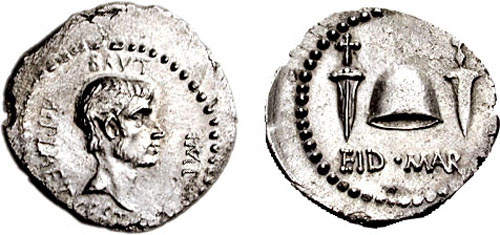Main Body
SEEKING FREEDOM
In Rome everyone (with the exception of the emperor) was ruled by someone else. In the following story, some slaves and horses get tired of being ruled by others and decide to seek freedom.

Note: As you know only the present tense, all the tenses in this passage are present: it may sound a little odd in parts when you translate it as a result. Try not to let it bother you.
Words and phrases in bold are glossed for you below.
Dea deum regit. Deus Iuliam regit. Iulia Marcum regit. Marcus puellam regit. Puella poetam regit. Poeta servum regit. Iulia et Marcus servam regunt. Eheu! Servus neminem regit. Serva neminem regit. Igitur, servus pileum petit et serva pileum petit. Servus et serva pileum petunt. Sed quomodo?
Iulia equum regit. Marcus equum regit. Puella equum regit. Poeta equum regit. Servus equum non regit. Serva equum non regit. Serva et servus equos non regunt. Servus et serva equos alunt et curant. Equi servam et servum amant. Servus et Serva equos quoque amant.
Equi in stabulā vivunt. Servus et serva in stabulā quoque vivunt. Unā nocte, serva dicit: “pileum peto. Serve! pileum petis?” Tunc, servus dicit: “pileum peto.” Subito, equus dicit: pileum quoque peto. Alius equus dicit: quoque pileum peto. Alius equus dicit: “pileum quoque peto.” Toti equi dicunt: “fugiamus! ad Narniam curramus, ibi nemo neminem regit. Serve et serva, ad Narniam nobiscum currite.”
Equi currunt. Serva currit. Servus currit. Toti ad Narniam currunt. Unā die, signum legunt. Dicit: “Avete, Amici et Amicae. Estis in Narniā!”
Serva epistolam scribit. Servus epistolam mittit. Epistola dicit:
Avete, domini, nunc non domini! Nunc, equos, servum, et servam non regitis. Equi me et servum ad pileum ducunt. Ad Narniam currimus. Ite in malam crucem! xxx

Vocabulary in order of appearance in the text above:
Eheu!: ‘woe!’ (or just eheu, if you prefer)
neminem: ‘no one’ (noun, accusative case)
Igitur: ‘therefore’
pileum: ‘freedom’ (noun, accusative case; a pileus was a type of hat worn by freed slaves at Saturnalia, and hence was sometimes used to mean freedom)
Sed quomodo: ‘but how?’
alunt: ‘feed’ (verb, third person plural, the subject is servus et serva; present indicative active, from alo, alere, alui, altum)
curant: ‘take care of’ (verb, third person plural, the subject is servus et serva, present indicative active: this verb is in a different conjugation, hence the different ending)
amant: ‘love’ (verb, third person plural, the subject is equi; present indicative active: this verb is in a different conjugation hence the different ending)
quoque: ‘also’
ad pileum: ‘to freedom’
in stabulā: ‘in a stable’
vivunt: ‘live’ (verb, third person plural, the subject is equi, present indicative active, from vivo, vivere, vixi, victum)
Unā nocte: ‘one night’
dicit: ‘says’ (3rd person singular, present indicative active; the subject is serva, from dico, dicere, dixi, dictum)
Tunc: ‘then’ (adverb)
Subito: ‘suddenly’ (adverb)
Alius equus: ‘another horse’
Toti equi: ‘all the horses’ (nominative plural and subject of dicunt)
fugiamus: ‘let us flee’
ad Narniam: ‘to Narnia’ (Narnia, -ae (f): a fictional country created by C.S. Lewis, where animals talk)
curramus: ‘let us run’
ibi nemo: ‘there no one’ (nemo is nominative singular and the subject of regit)
nobiscum currite: ‘run with us’
Toti: ‘all’ (nominative plural and subject of currunt)
Unā die: ‘one day’
signum: ‘sign’ (accusative singular, object of legunt)
Avete: ‘Hello!’
Domini: ‘Masters’ (noun, vocative plural of dominus, -i (m): master, lord)
Estis in Narniā: ‘you are in Narnia’
epistolam: ‘letter ‘(noun, accusative of epistula, -ae (f): letter)
me: ‘me’ (accusative singular of the personal pronoun)
Ite in malam crucem: Literally ‘Go onto a bad cross’ it is roughly the equivalent of ‘Go die in a fire’ for the Romans).
